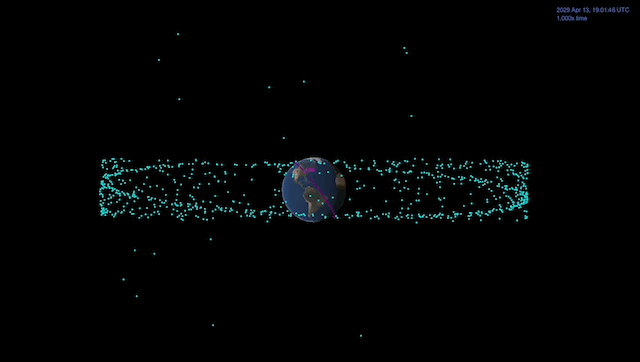
Study Suggests 'God Of Chaos' Asteroid Apophis Could Hit Earth In 2029 — We’ll Know For Sure In 3 Years
The 'God of Chaos' should pass just 20,000 miles from Earth.

The possibility of asteroids impacting Earth has long been a concern among scientists and the public. While many asteroids pass harmlessly by our planet, some can get quite close, raising fears of potential collisions. The asteroid Apophis, also known as the "God of Chaos," is one such object.
This 1,100-foot space rock, roughly the size of the Eiffel Tower, has gained attention due to its scheduled close fly-by with Earth in 2029. Although the likelihood of it hitting our planet is extremely low, new research suggests that it is not entirely impossible.
Apophis was first discovered in 2004 and is classified as a "potentially hazardous" asteroid. Named after an ancient Egyptian god symbolizing darkness and disorder, it has captured the imagination of many who wonder what might happen if it were to strike Earth.
While Apophis is not large enough to cause planet-wide destruction, it is certainly big enough to obliterate a city and have severe global consequences. According to NASA, the asteroid will pass just under 20,000 miles from Earth on April 13, 2029.
This distance is less than a tenth of the gap between Earth and the moon, meaning it will come uncomfortably close to some of our satellites. Despite these concerns, initial observations confirmed that Apophis would not collide with Earth during its 2029 approach.
However, asteroids are subject to changes in their trajectories, especially if smaller space rocks strike them. This phenomenon was demonstrated in 2022 when NASA’s DART mission successfully altered the course of the asteroid Dimorphos by intentionally crashing a spacecraft into it.
In the case of Apophis, researchers have expressed concerns that a similar event could occur over the next five years, which might push the asteroid onto a collision path with Earth.
The asteroid Apophis, often called the "God of Chaos," is expected to make a dangerously close approach to Earth in 2029.
 Shutterstock
Shutterstock
A recent study by astronomer Paul Wiegert from Western University in Canada investigated this scenario. Wiegert is an expert in moving objects within the solar system and used computer simulations to calculate the probability of Apophis being hit by another asteroid before its 2029 fly-by. His research revealed that this is highly unlikely but not impossible.
The odds of a collision that could alter Apophis’ path are around one in a million. However, the chance that such an impact could cause Apophis to strike Earth is even slimmer, at less than one in a billion.
The asteroid Apophis, highlighted in yellow, will pass by Earth in 2029 at a distance closer than some satellites, represented in blue, that orbit our planet. The purple line marks the orbit of the International Space Station.

In an earlier study, Wiegert and his team had already ruled out the possibility of known asteroids colliding with Apophis. However, the risk posed by unknown asteroids, which are difficult to detect due to their small size or position near the sun, remains. These undiscovered objects could pose a threat by knocking Apophis off its predicted course.
The ESA's Herschel Space Observatory spotted asteroid Apophis as it neared Earth on January 5 and 6, 2013.

Although the likelihood of a collision is minimal, astronomers will continue to monitor Apophis closely. The asteroid is currently challenging to observe because of its proximity to the sun, but by 2027, it will be visible again, allowing researchers to refine their predictions.
By then, they will have a clearer understanding of whether Apophis’ trajectory has changed and if there is any risk of a collision with Earth.
Damjan







